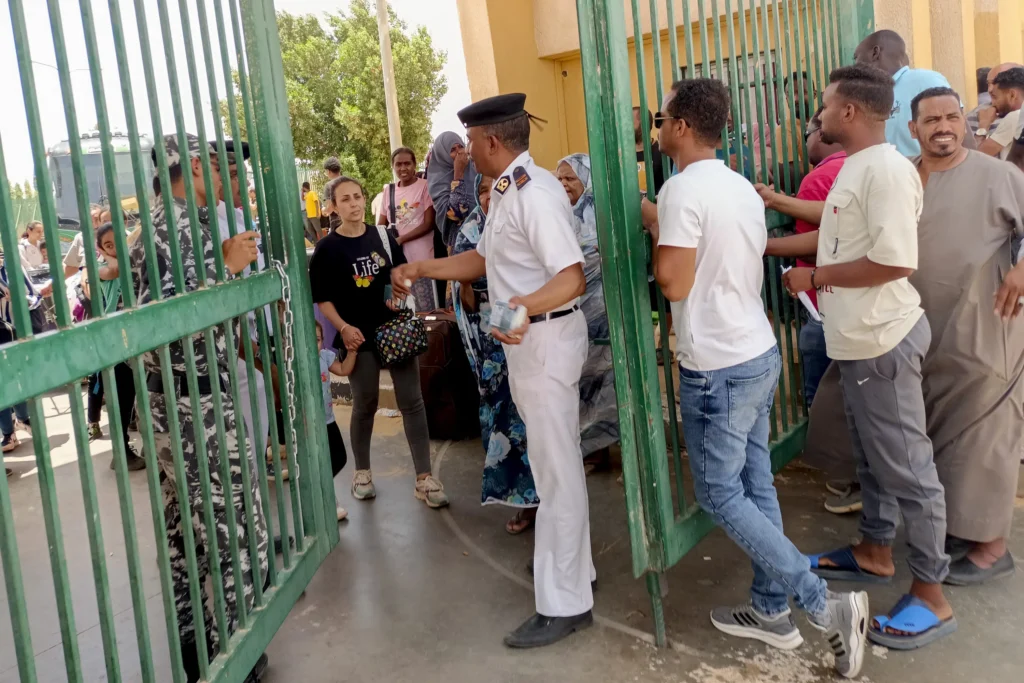Heavy explosions and gunfire rocked Sudan’s capital, Khartoum, and its twin city of Omdurman early Friday, residents said, despite the extension of a fragile truce between the county’s two top generals whose power struggle has killed hundreds.
After two weeks of fighting that has turned Khartoum into a war zone and thrown Sudan into turmoil, a wide-ranging group of international mediators — including African and Arab nations, the United Nations and the United States — were intensifying their pressure on the rival generals to enter talks on resolving the crisis.
So far, however, they have managed to achieve only a series of fragile temporary cease-fires that failed to stop clashes but created enough of a lull for tens of thousands of Sudanese to flee to safer areas and for foreign nations to evacuate thousands of their citizens by land, air and sea.
In a sign of the persistent chaos, Turkey said one of its evacuation planes was hit by gunfire outside Khartoum with no casualties on Friday, hours after both sides accepted a 72-hour truce extension.
The U.K. said it would end its evacuation flights on Saturday evening, after numbers of British citizens seeking an airlift began to decline. After a slow start that attracted criticism, Britain has run regular military flights from an airfield near Khartoum to Cyprus. As of Friday evening, it had airlifted 1,573 people, including nationals of several European countries.
“You have another 24 hours if you are eligible to make your way to the airport and we will get you on a plane,” Deputy Prime Minister Oliver Dowden said.
Fierce clashes with frequent explosions and gunfire continued Friday in Khartoum’s upscale neighborhood of Kafouri, where the military’s warplanes bombed its rivals, the paramilitary Rapid Support Forces, residents said. Clashes were also reported around the military’s headquarters, the Republican Palace and the area close to the Khartoum international airport. All these areas have been flashpoints since the war erupted on April 15. Explosions also rang out across the river in Omdurman.
Doctors in the Sudanese capital said the RSF has been abducting medical personnel to treat its wounded fighters — a sign the paramilitary was struggling to get medical support.
The Turkish Defense Ministry said “light weapons were fired” at a C-130 aircraft heading to Wadi Sayidna airbase on Khartoum’s northern outskirts to evacuate Turkish civilians. The plane landed safely, the ministry said in a tweet, and no personnel were injured.
The Sudanese military blamed the RSF, which denied firing on the plane.
Over the past 14 days of pummeling each other, the military led by Gen. Abdel Fattah Burhan and the RSF led by Gen. Mohammed Hamdan Dagalo, have each failed to deal a decisive blow to the other in their struggle for control of Africa’s third largest nation.
Still, world powers have struggled to get them to adhere to announced cease-fires. A bloc of East Africa nations has put forward a initiative for the two sides to hold talks, and a gamut of mediators are promoting the plan, including the African Union, the United States, the United Arab Emirates, Saudi Arabia and the United Nations.
Burhan on Friday ruled out negotiations with Dagalo, accusing him of orchestrating a rebellion against the state, a day after the military expressed openness to the talks under the initiative. Dagalo “wants to rule Sudan, seize its resources and magnify his wealth,” Burhan said in an interview with U.S.-funded Alhurra TV, denying that he wants power for himself.
Both Burhan and Dagalo have been involved in crushing pro-democracy activists and together they pushed out civilians from an interim government in a coup in 2021. The former allies fell out in recent months in disputes over an internationally brokered deal meant to pave the way back to a civilian government, including over the issue of incorporating the RSF into the military.
The rivals’ battles in the streets with artillery barrages, airstrikes and gunfire have wreaked misery on millions of Sudanese caught between them. Many have left Khartoum to the northern borders with Egypt, or to the city of Port Sudan on the Red Sea.
